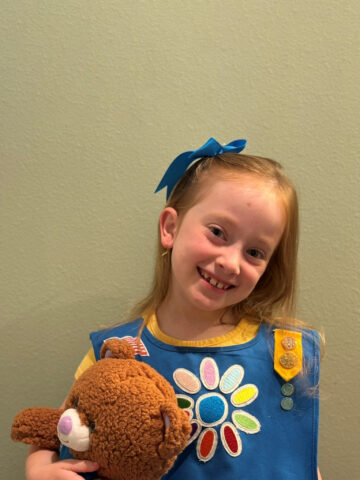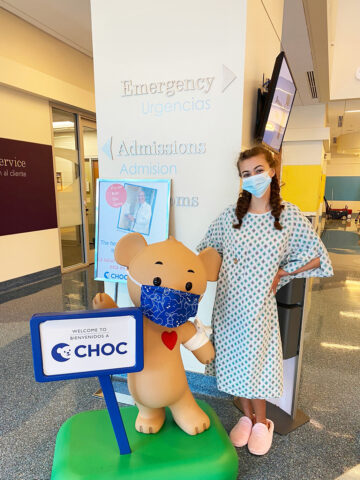Having surgery is not easy, and no one knows that better than someone who has been through it.
CHOC patients who have undergone surgery for either pectus excavatum or scoliosis have banded together to form a mentorship program for other patients who will be undergoing the same procedures. Teens and adolescents can connect with a trained mentor who knows what they’re going through and can help them navigate the physical and emotional aspects of surgery and recovery.
While it’s important to seek guidance from your medical team, sometimes as a teenager you just want to hear straight from other teens. We spoke with a few mentors who had the Nuss procedure to correct pectus excavatum (sunken chest), and they offered the following words of advice and encouragement.
What is one thing you wish you would have known before pectus excavatum surgery?
“I wish I would have known to just relax. I know it’s a hectic time; the number one tip from me is just to have a good night’s sleep and prepare. Bring all the essentials and more.”—Matthew H., now 17

“I wish I was more aware of the sudden diet change to ice chips during the first day of post-op care. I remember feeling uncomfortable about my inability to eat food or drink water a few hours after my procedure. If I knew how long I would be on ice chips after my procedure, I feel that I would’ve been able to push through it better than I remember.”—Matthew V., now 22

“The one thing I wish I had known before the surgery was how long each day actually was. You never really know how long a day actually is before you go through a surgery. I ended up only bringing my phone and a few books which I ended up rereading during my stay. There was only so much sleep I could get, and I found myself waiting for the next day; sometimes for hours at a time. If I could go back, I probably would have brought more things to occupy my time, not just my phone but also maybe my laptop, some movies and more books. My family and friends ended up being a really big part of my recovery and I can’t thank them enough. Their visits got me through the long days and I found myself up at night waiting for their next visit.”—Brandon, now 20
What modifications did you make after surgery?
“After surgery, I made sure to wear the most comfortable clothes and to have many pillows, especially since it’s impossible to lay on your side after the procedure.”—Matthew H.
“After surgery, I kept my phone near my bed so I could call one of my family members to help me get up every morning for the first two weeks. I also had to make sure that I was sleeping flat on my back and not turn over in my sleep. However, sleeping flat on my back in post-op helped me prepare for sleeping at home.”—Matthew V.
“We ended up actually propping my bed up a bit and angling it with pieces of wood. This made getting out of bed on my own a bit more manageable. I also developed a method of getting out of bed that I ended up using for almost two months after my surgery; I would bring my legs toward my chest with my hands while on my back and roll forward. This helped me avoid having to use my core to get up. Walking also became a pretty big part of my recovery experience. I would walk with my parents to the end of the neighborhood and back to try and regain some of my strength. I think the worst thing you can do for your recovery is to stay sedentary.”—Brandon

Knowing the recovery that comes with this surgery, would you choose to do it again?
“The month’s worth of pain is definitely worth a lifetime of improved quality of life. The month may seem like an eternity, but trust me, after the whole ordeal is over, you’ll be grateful that you’ve made the right decision.”—Matthew H.
“I would choose to do the surgery again. While it was a painful experience at first, the results you get from the procedure are well worth it.”—Matthew V.
“I would definitely do it again and I encourage anyone else reconsidering the surgery because of pain to do it. I ended up making a full recovery and I feel as if my lungs weren’t as limited after. I felt more comfortable doing sports and going out. The surgery made me feel more confident and comfortable in my own skin and in my opinion that’s worth the pain.”—Brandon
What advice would you give someone before their own surgery and hospital stay?
“If you’re a light sleeper, like me, make sure to bring earplugs or a speaker that can play white noise. There’s a lot of noise and that definitely affected my sleep time. Make sure you can swallow pills. I don’t know if it’s just me, but I couldn’t swallow the biggest pills the nurses gave me, so I had to use the pill crusher and that was not fun for 3 a.m. me. Eat a lot of food and walk around. I know after the surgery you may have a small appetite and not want to walk around. But eating more and walking around really sped up my recovery process. The spirometer really helps too. I left the hospital after four days.”—Matthew H.
“I would tell them that they’re in good hands and that the staff is very responsive and will take very good care of them. I’d also advise them to be patient with the recovery. Once the pain subsides, they’ll begin to feel the results.”–Matthew V.
“I would like to tell others considering the surgery that they aren’t alone. Dozens of us get these types of surgery at CHOC. You are in good hands, if not the best hands possible. Every person in the hospital – staff, nurses, doctors, etc. – is trying to make your stay at the hospital as comfortable as possible. While the surgery may seem like a really big leap of faith, just know that we’re all here for you and you can talk to any one of us, whether that’s staff or a patient. In the end we all want the same thing— for you, the patient, to feel better and recover as quickly as possible. So don’t feel alone, we’ll be here for you whenever you’re ready.”–Brandon





